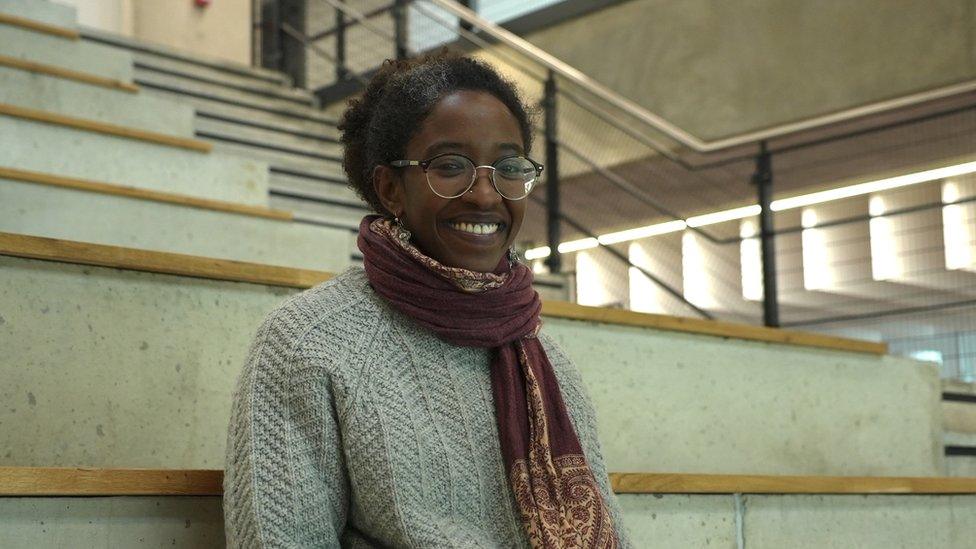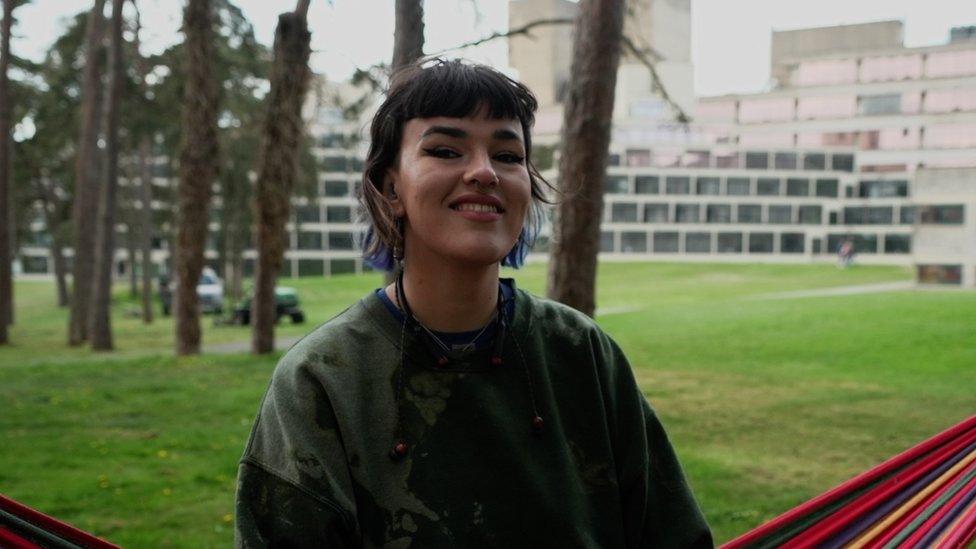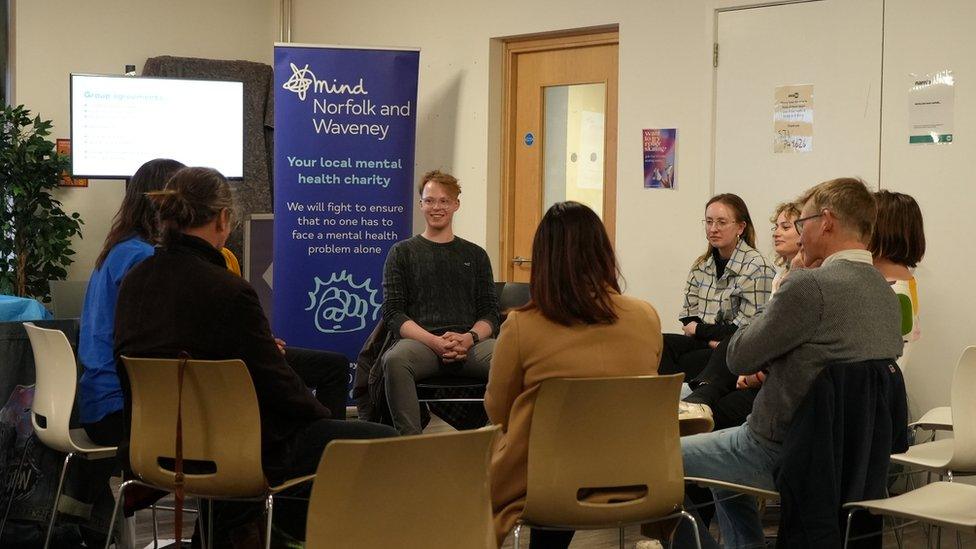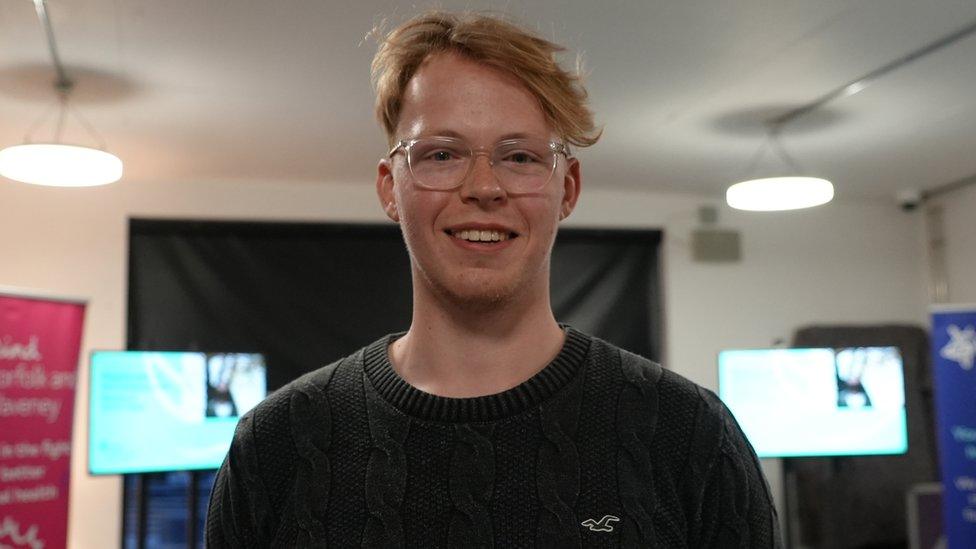Climate change: Don't let doom win, project tells worriers
- Published

Student Azza Dirar wants the programme to end the taboo around climate anxiety
A new project has been launched to address rising climate anxiety in students at the University of East Anglia.
At the opening in Norwich, students told BBC News they felt hopelessness, anger and despair about climate change.
They worry how they will live in a world with an unpredictable climate and the destruction of nature.
On Thursday a new survey found that 45% of UK students worry about climate change once a week or more.
Literature student Meg Watts, 22, said that she had experienced depression after being overwhelmed by the scale of problems facing the planet. And she sought therapy after developing disordered eating when trying to cut out food packaged with plastic.
The new programme was developed with mental health charity Norfolk and Waveney Mind, who realised young people were coming for counselling about their fears about climate change.
Common worries were about food security and whether or not to have children, explained Ruth Taylor from Mind. "Young people are trying to get ready for what is coming," she suggests.

Meg Watts says she's still "terrified" by climate change but her feelings are now manageable
The project aims to address taboos around climate anxiety and give students the skills to manage their feelings. The organisers say it's one of the first university projects in the UK to address the issue.
It includes a series of so-called climate cafes - an informal group session where people discuss their feelings - and an eight-week course that teaches students how to turn feelings of despair and anger into "hopeful action".
Student volunteers are being trained to lead discussion groups that they plan to extend to older generations in Norfolk.
Azza Dirar, 30, said she has felt deeply depressed and despairing after witnessing environmental destruction in her home country Ethiopia. She encourages students to "tell the truth about their feelings and appreciate the beauty of life still here".
Sitting on chairs in circles, groups of students at the launch on Tuesday described their feelings about climate change.

"I have phases - sometimes I feel like it's not my fault, it's down to people-in-power. Then I read something else that says if we are not taking action, we are like climate deniers," said one participant.
"I have ups and downs. My future job will be about helping people, but sometimes I think what's the point in my education if we can't stop climate change?" another said.
Political inaction and negative news stories contribute to feelings of despair, some said.
Summing up their feelings in one word after the discussion, a handful of participants said "motivated", "peaceful," "empowered" and "encouraged", adding that sharing made them less alone.
Speaking to BBC News, development student Stephen Kirk, 21, said his anxieties around climate change began at school. He dug for information online about global warming and biodiversity, and became anxious and angry.
"Sometimes I feel quite alone with climate change and the emotions that I feel around it," he explained.
But the climate cafe was a "safe and open space to just talk" without worrying about how others react, he said.

Stephen Kirk said he's felt angry and anxious about climate change but is learning to manage it
"I have come to terms that I'm allowed to feel angry at this situation - I didn't necessarily cause it and I was only born into it.
"I can now use that anger and that energy, and turn it into something good," he said.
And medical student Amit Singh, 22, explained he felt "validated" by the discussion. "People know it's an anxiety-inducing issue, but it's not talked about very often. Hearing the speakers' amazing talks made me feel in control when talking about my own experiences," he said.
"People are scared to feel vulnerable, but once we start speaking, we realise that we're all in the same boat," he explains, adding he thinks it's "vital" that climate anxiety is addressed more widely in the UK.
Like others, he believes it's important people learn to manage their anxiety because it will "enable them to play a part in addressing the crisis".
Research has found widespread psychological distress in young people about climate change, external that affects their daily lives.
The 2022 Global Student Survey, external conducted by Yonder for Chegg.org found that 39% of UK undergraduates say they reduced their meat consumption in the last five years, and 26% say climate change will affect their decision on whether to have children.

Students' advice on how to cope with climate anxiety
Recognise your feelings - it's OK to feel bad about climate change
Write down your anxieties in a list. Cross off any you can't control
Find things that calm you down when you are distressed - it could be a song, exercise, or meditation
Try to find something - small or big - that you can do and commit yourself to it

For more information and advice visit the BBC Action Line